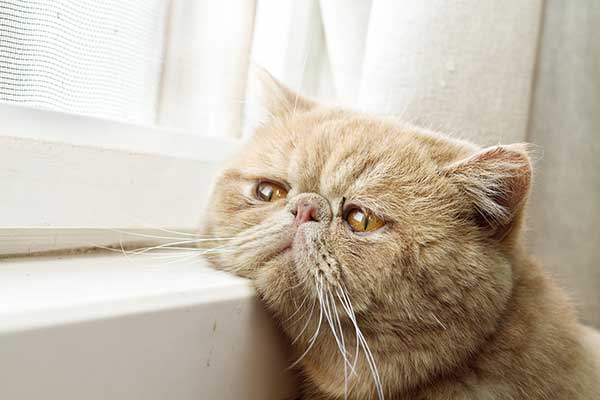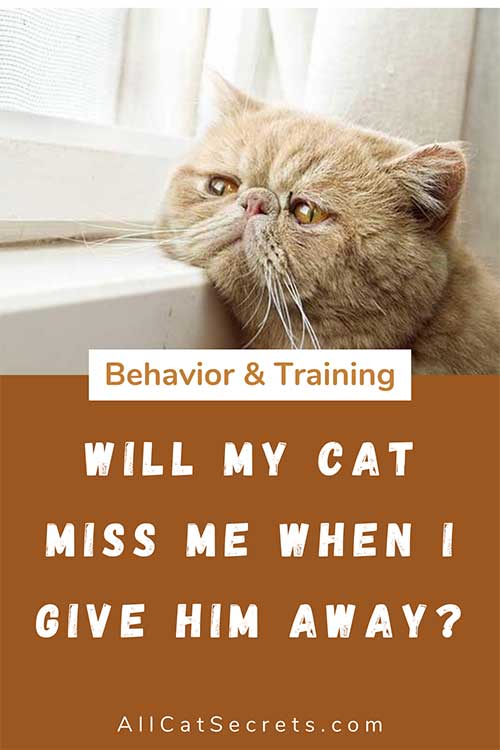Parting ways with your cute, adorable pet is one of the most difficult experiences you can ever go through as a pet parent. And if you’ve lived with the pet for a substantial amount of time, it becomes even more difficult to go your separate ways. However, certain circumstances may necessitate a temporary or even permanent separation from your furry friend.
According to experts, different pets have their unique levels of attachment to their owners. For instance, dogs are generally considered to be more loyal to their owners compared to cats.
In fact, there’s a common theory that domestic cats only put up with their human owners because of shared interests. That if your cat could crack a way to fend for his own food and shelter, he might just abandon you.
In light of these assumptions, you may find yourself wondering, will my cat miss me when I give him away?
The short answer is yes, your cat will definitely miss you when you give it away. Depending on the depth of attachment you have with your feline friend, the cat may even attempt to return home, should that be geographically possible.
Why Do Cats Miss Their Owners?
One of the main reasons your feline friend will miss you is that cats are fairly affectionate animals, and have retentive memories too. So, giving away a cat that you’ve lived with for quite some time might trigger feelings of loneliness on the part of the animal.
It’s also worth noting that cats are creatures of habit, and a slight disruption in their routines is all it takes to throw them off balance. As the cat struggles to acclimatize to his new environment, he will miss his former schedule. Part of that schedule includes you feeding, petting, grooming, or playing with him.
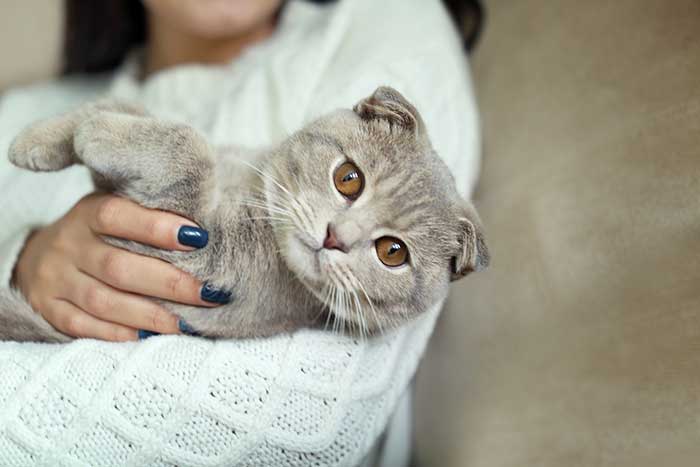
In addition to their love affair for fixed routines, cats also happen to miss their former territories when rehomed.
Remember that cats have a way of scent-marking their territories. It’s one of their adaptations which helps to declare the patch taken and ward off potential intruders. When cats mark their territories, they literally spare nothing. You’ll see them spraying their urine on, or rubbing their bodies against outdoor scratching posts, the walls of the house, indoor furniture, and even their owners.
A cat’s own scent is the first line of assurance that the territory belongs to the cat. It’s also an excellent way of communicating with other cats. So, when a cat finds himself in a new home where he can no longer smell his own scent, the animal is bound to get a little anxious.
However, it’s also worth noting that cats are reasonably adaptive animals. Provided they get the right kind of treatment and stimulation in their new home, they may miss you only for a couple of days.
ALSO READ: Why Do Cats Cover Their Face When They Sleep? (5 Reasons)
Signs That a Cat Misses an Owner
One of the most nagging concerns among many cat owners intending to give their feline friends away is, will my cat miss me if I give her away?
Now, cats are quite mysterious pets. They’re probably the most mysterious animals that humans have ever domesticated. Cats prefer to keep much of their suffering to themselves.
You may never know the extent of physical pain or mental anguish that your feline friend is going through unless you take a keener examination into his behavior. That’s in sharp contrast to dogs who are known to express their emotions more clearly.
Based on these facts, you could be wondering, do cats miss their previous owners?
As we’ve already indicated, your cat will surely miss you if you give him away. The only problem is that as the new cat owner, you may not realize that your cat misses his previous owner if you don’t spend a closer time with him. He may carry on alright. But deep down, your furry friend could be grappling with serious emotional trauma.
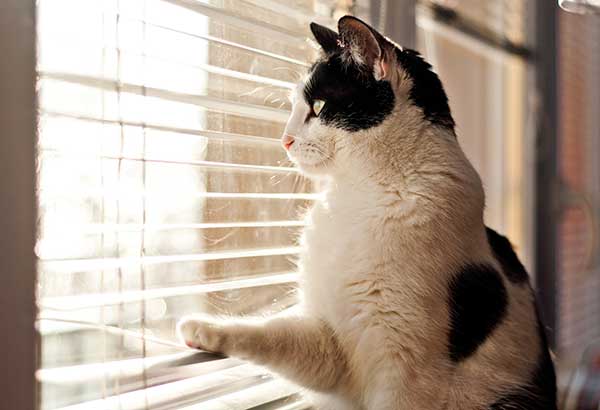
The following are some of the telltale signs that a cat misses his previous owner;
1. Excessive Vocalization and Stretching When You Return
Cats have a sophisticated vocalization system. One of the ways cats utilize their vocalizations is by reminding their owners of how much they miss them.
If your cat missed you in your absence, take note of how he vocalizes upon your return. If he meows or purrs a bit more intensely than he usually does, then the chances are that your feline friend missed you a lot.
A study from the Public Library of Science (PLOS) observed the behavior of cats when left for half an hour vs. several hours. The findings revealed that cats that were left for extended durations of time purred and stretched more when their owners returned, as compared to those abandoned for thirty minutes.
Therefore, researchers concluded that excessive vocalization and stretching suggest that cats are generally happy to reunite with their owners.
2. A Strong Desire for Affection and Attention
Compared to dogs, cats are a bit less affectionate animals. Unlike dogs, cats generally pursue their happiness on their own terms. So, when your cat demonstrates unreasonable attachment towards you, that could suggest that the cat misses you.
An overly affectionate cat will follow you around when you return, constantly rub his head against your legs, and even block the doorway when you attempt to leave the house.
Not only is the cat seeking affection, but also attention. He wants to let you know that you’ve been gone for too long, and that it’s about time you spent some time with him.
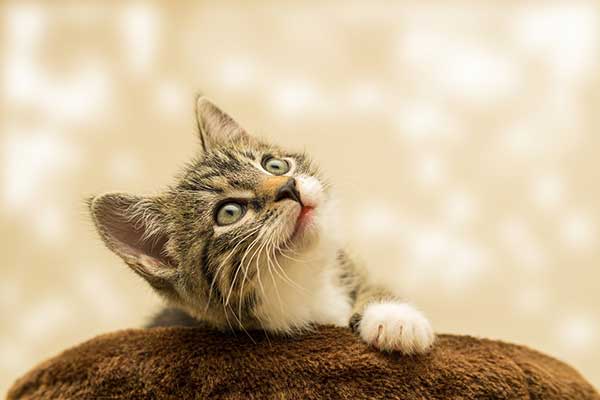
3. Insecure Attachment with the New Owner
Being creatures of habit, cats take a significant duration to acclimatize to their new surroundings. That’s understandable.
However, a cat that was too attached to his previous owner may take even longer to get used to his new owner. In the process, the cat may develop an unhealthy and insecure attachment with his new parent.
He may refuse to be fed, petted, or groomed by his new owner, and an insistence to do so could trigger some violent confrontations. If the cat is naturally skittish and reclusive, he may retreat into his room and stay there till the new owner is out of sight.
4. Excessive Grooming
Cats are naturally clean animals. They spend a significant portion of their waking hours grooming themselves.
However, there’s a fine line between a cat responding to his natural grooming instincts and one that’s overwhelmed by grief and loneliness on account of separation from his previous owner.
It’s also worth noting that excessive grooming isn’t healthy for your cat. Besides distracting the cat and exposing it to potential threats, excessive grooming could also cause or exacerbate existing skin wounds. Plus, it’s one of the leading causes of furballs.
5. Destructive Behavior
Most cats develop boredom after missing their (previous) owners for long. The boredom is usually tied to separation anxiety, though it can also exist on its own.
A cat that’s bored or unhappy about his new environment may develop negative energy. The cat could result in destructive behavior, including pooing or peeing outside of its litter box, refusal to eat or drink, scratching furniture, and playing rough with his fellow cats.
6. Stress and Anxiety
A cat that misses his owner may get anxious when the owner returns or is about to leave the house.
If the cat has already been rehomed, the stress and anxiety emanating from missing his previous owner could manifest throughout the day. On a long enough timeline, the condition may lead to separation anxiety.
That underscores the importance of always keeping your feline friend physically and mentally engaged in your absence. Whether you’ve been away from your cat for extended periods of time or you’re dealing with a rehomed cat, always ensure that the animal gets enough stimulation.
Doing that may not prevent him from missing his previous owner. But it will go a long way in averting separation anxiety.
7. Physical Illness
Although quite rare, a cat that misses his owner may also develop a physical illness. Most of these diseases start as generalized fatigue before degenerating into something more serious.
Some cats have been known to develop sleeping disorders like insomnia upon separation from their previous owners. Others may sleep longer than they should, only to get up feeling lethargic and experience foul moods throughout their wakeful hours.
ALSO READ: Why Does My Cat Attack Me And No One Else? (6 Reasons)
Do Cats Feel Abandoned When You Give Them Away?
Cats may not feel abandoned when you give them away. Instead, they may feel lonely, sad, bored, and develop some of the symptoms of separation anxiety, such as;
✔ Excessive vocalization, including moaning, meowing, crying, and purring,
✔ Gastrointestinal issues, such as nausea and vomiting, diarrhea which leads to dehydration, loss of appetite, and abdominal pain,
✔ Not eating or drinking as regularly as he should,
✔ Bowel and bladder incontinence,
✔ Eliminating in inappropriate places, and
✔ Self-destructive behavior like excessive grooming, licking, scratching, and sleeping.
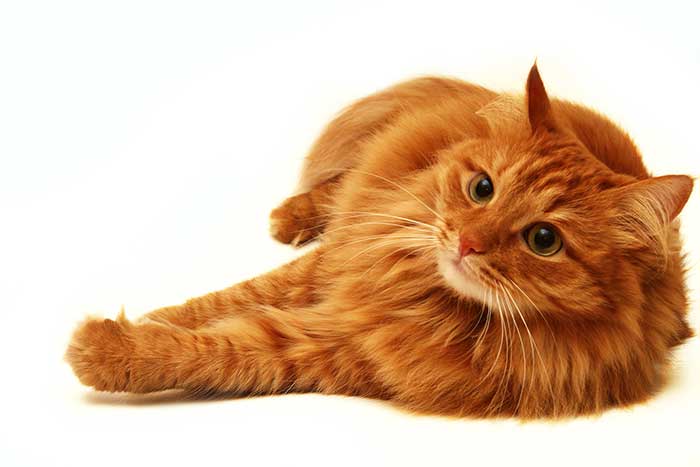
As a cat’s new parent, remember that the above symptoms do not necessarily imply that your cat has separation anxiety. But still, it will help to keep the cat stimulated to ensure that he doesn’t feel lonely. Remember that it’s during his lonely times that the cat begins to miss his previous owner.
The following are other measures you can undertake to avert separation anxiety, as well as prevent your cat from missing his previous owner;
✔ Provide the cat with enough toys to keep him physically and mentally active in your absence.
✔ Whenever you’re around, spend some quality time petting, grooming, or playing with your cat.
✔ If you can, hire a pet sitter to keep the cat active when you’re gone.
✔ Each time before leaving the house, make provisions for the cat’s food, water, and fresh air so that his environment is as comfortable as it can be.
✔ Hide the food in the house so that the cat can look for it. Just ensure you keep it out of sight but not out of reach.
✔ Consider spraying cat pheromones on outdoor posts.
✔ Leave the radio, television, and lights on to avert boredom.
In addition to missing his previous owner, a cat will also miss every other thing about his former home, including the food, the playing patch, and other members of the household.
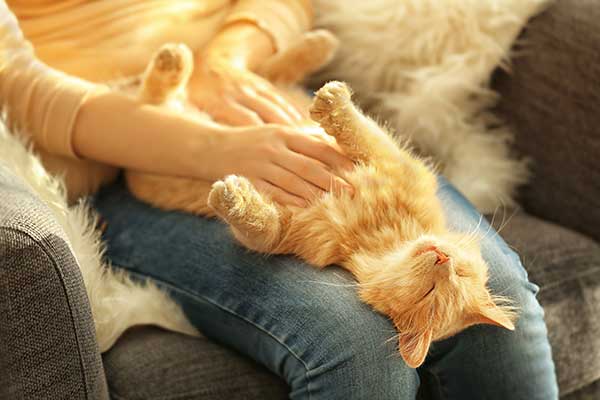
Now, some cat owners often wonder, how long does it take for a cat to forget its owner and will my cat remember me after one year?
These concerns are more common in cat owners that intend to give their pets away temporarily. Ideally, that will depend on the strength of the emotional bond a cat had established with his previous owner. The stronger the bond, the longer the cat will remember his previous owner. But on average, cats take a few months before forgetting their owners.
So, Do Cats Care If You Give Them Away?
They sure do. If you must give your cat away temporarily, do so tactfully, so that your feline friend doesn’t miss you so much when you’re gone. That may include getting the cat toys, hiring a cat sitter, and making his home as comfortable as possible. And if you’re giving the animal away for good, begin by introducing and familiarizing him with his new owner before he can finally be rehomed.

